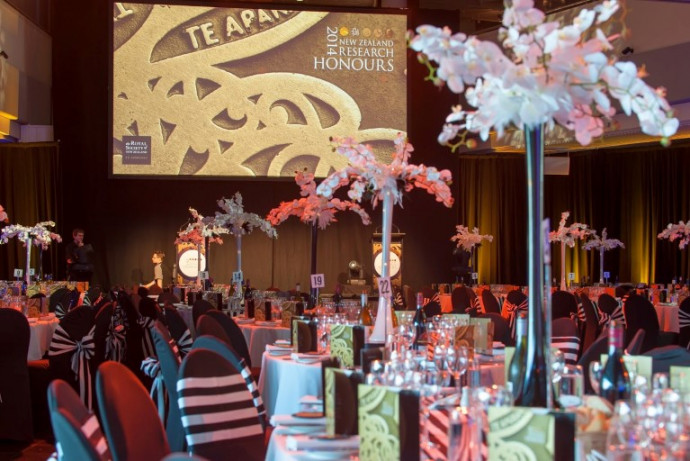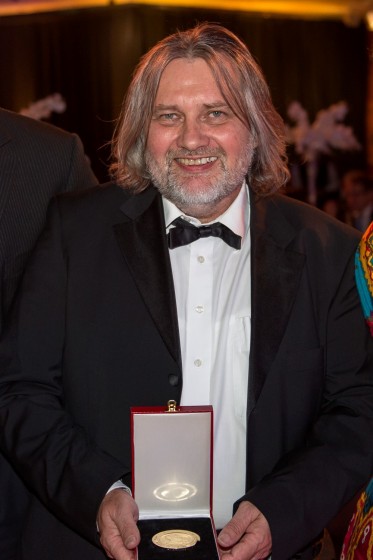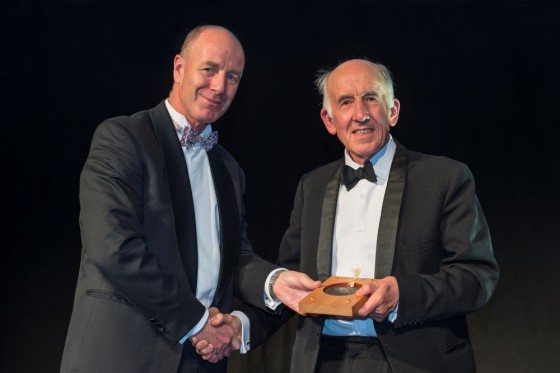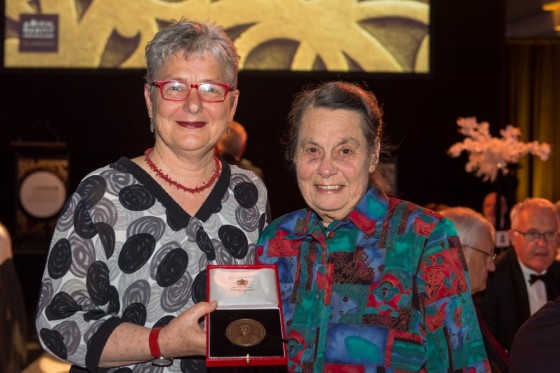News
Published 2 November 20142014 Research Honours Dinner

The Royal Society of New Zealand presented twelve medals at the 2014 Research Honours Dinner.
View photographs from the event.

Distinguished Professor Peter Schwerdtfeger, Rutherford Medal
The Rutherford Medal, the top medal awarded by the Royal Society of New Zealand, was presented to Distinguished Professor Peter Schwerdtfeger FRSNZ of Massey University for his world-leading contribution to fundamental aspects of chemical and physical phenomena in atoms, molecules and condensed matter. Read more on the 2014 winner of the Rutherford Medal.
Dr Rob Murdoch, General Manager of Research at the National Institute of Water and Atmospheric Research (NIWA) won the Thomson Medal awarded for science and technology leadership and organisation. The medal recognises his contribution to the development of environmental science in New Zealand as a science leader. Read more on the 2014 winner of the Thomson Medal.
The Callaghan Medal for science communication was awarded to University of Otago geneticist Associate Professor Peter Dearden for the outreach activities of Genetics Otago that he helped form and his involvement in communicating his genetics research on honey bees with the beekeeping industry and the public. Read more on the 2014 winner of the Callaghan Medal.
The MacDiarmid Medal for research with potential for human benefit was awarded to clinician scientist Professor Alistair Gunn FRSNZ, University of Auckland, for his pioneering research on using brain cooling to prevent brain injury in babies who experience low oxygen at birth. This treatment is now the standard of care around the world and can prevent disability in all but the most affected newborns. Read more on the 2014 winner of the MacDiarmid Medal.
The Pickering Medal for application of technology was awarded to Professor Simon Malpas, who has developed and commercialised implantable wireless sensors that can monitor physiological processes such as heart activity or lung function in the body. Professor Malpas is both a Professor of Physiology at the University of Auckland and head of research for Millar Inc, a company which formed from a merger with his previous company (Telemetry Research), to sell these devices worldwide, including to all the major pharmaceutical companies for drug testing. Read more on the 2014 winner of the Pickering Medal.

Charles Higham presented the Mason Durie Medal by Andrew Cleland
Archaeologist Professor Charles Higham FRSNZ from the University of Otago was awarded the Mason Durie Medal for social sciences for his work to understand social change in Southeast Asia over three millennia. His work identified a series of social changes that ultimately led to the establishment of the rise of the Angkor state in modern-day Thailand. Read more on the 2014 winner of the Mason Durie Medal.
Distinguished Professor Brian Boyd FRSNZ from the University of Auckland was presented with the Humanities Aronui Medal for his wide-ranging contribution to the humanities. Recognised as the leading world scholar on novelist Vladimir Nabokov, Distinguished Professor Boyd has written on a wide range of literature from Homer to Shakespeare and more recently has been exploring whether our minds and behaviour can be reshaped by art and literature. Read more on the 2014 winner of the Humanities Aronui Medal.
Professor Lydia Wevers, Director of the Stout Research Centre at Victoria University of Wellington, has been awarded the Pou Aronui Award for her dedication to promoting New Zealand studies, literature and art. A literary critic, historian, editor and reviewer, Professor Wevers has researched New Zealand’s writing and print culture, edited and collated many collections of Australasian literature, has served on numerous arts bodies and has played key roles in academic administration of the humanities in New Zealand. Read more on the 2014 winner of the Pou Aronui Award.
Emeritus Professor David Vere-Jones FRSNZ from Victoria University of Wellington was awarded the Jones Medal to recognise his lifetime achievement in statistics, both for his novel work on forecasting earthquakes and earthquake risk and for his contribution to the teaching of statistics and mathematics in New Zealand. Read more on the 2014 winner of the Jones Medal.
Distinguished Professor Marston Conder FRSNZ from the University of Auckland was awarded the Hector Medal for his outstanding contribution to mathematics. His main interest is in group theory and its applications, especially to the study of symmetry. He is considered a world authority on discrete objects with maximum possible symmetry in their class. He is also renowned for pioneering the application of an array of algebraic, combinatorial and computational techniques to find answers to open questions in a wide range of fields. Read more on the 2014 winner of the Hector Medal.

Alison Joans presented with the Dame Jones Metge award by Dame Jones Metge
Professor Alison Jones has been awarded the Dame Joan Metge Medal for the significant impact she has made on New Zealand educational research and practice, particularly on Māori-Pakeha educational relationships and women’s education at tertiary level. In addition to her research, she has mentored many early-career researchers and teaches academic writing. Her collaboration with Professor Kuni Jenkins on the setting up of New Zealand’s first school in 1816 has resulted in an award-winning book, a travelling exhibition and the development of teaching resources. Read more on the 2014 winner of the Dame Joan Metge Medal.
The Sir Charles Hercus Medal for excellence in biomedical and health sciences was awarded to Professor Parry Guilford of the University of Otago. Professor Guilford is internationally recognised for his work that established the gene mutation that can lead to hereditary stomach cancer in families. Since the discovery of the gene, approximately 350 families have been diagnosed worldwide, leading to dramatic improvements in clinical management and cancer prevention. Professor Guilford is also chief scientist for Pacific Edge, a cancer diagnostics company which has developed various products including a urine test for bladder cancer. Read more on the 2014 winner of the Sir Charles Hercus Medal.
